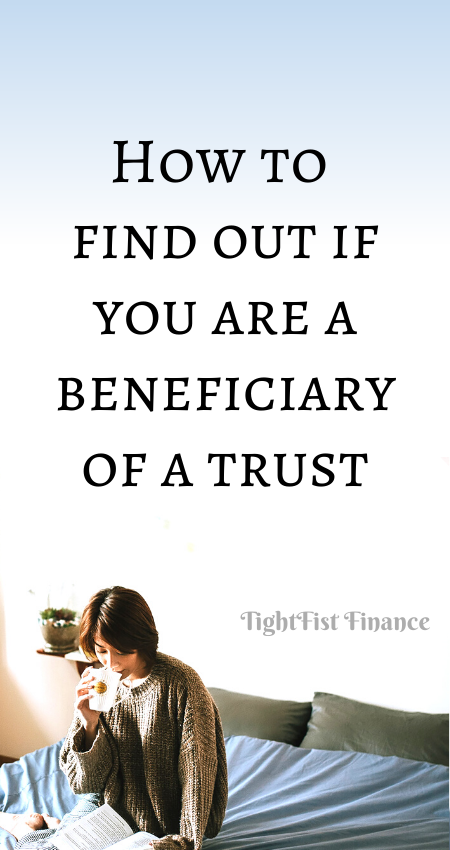How can you find out if you are a beneficiary of a trust?
The easiest way to find out if you are a beneficiary of a trust is to ask the trustee. Alternatively, you can contact the courthouse in the county where the settler lived. The courthouse may be able to give you the trust lawyers information or a copy of the trust.
Imagine, being able to find out if you are the beneficiary of a trust. Deaths in a family can make relatives act strange and even unreasonable.
However, there are more than one way to find out who’s a beneficiary.
Luckily for you, I’ll show you different ways to find out if you are on the beneficiary list. I’ll show you who should be contacting you and how long they have to do so. You’ll be well on your way to moving onto the next chapter of your life.

This article may contain affiliate links which pay a commission and support this blog. Thank you for your support!
How to find out if you are a beneficiary of a trust
To find out if you are the beneficiary of a trust, ask the trustee for a copy of the trust. You may also be able to obtain a copy from the courthouse in the county from which the settlor lived. The settlor’s attorney or financial planner may have a copy of the trust.
The easiest way to figure out if you are the beneficiary of a trust is to ask the trustee for a copy. Oftentimes, beneficiaries will already know who the trustee is, so it’s the best place to start.
However, sometimes the trustee tries to play hardball with the trust’s information.
For example, your brother, sister, or other relative might be the trustee. The only information you might receive from them is that you are not a beneficiary of the trust. However, if the settlor was someone close to you, such as a parent, you may still be entitled to a copy of the trust.
In this case, you should contact a lawyer to write to the trustee asking for a copy of the trust. Doing so provides a paper trail that a written notice was given requesting the trust copy. You will either receive a copy of the trust or the lawyer can help you petition the court for a copy.
However, let’s assume your parent (the settlor) lived in the same county as you. You could go down to the courthouse and see if a copy is available at the courthouse. If it isn’t, the name of the settlor’s lawyer may be on file for you to contact.
You may already be aware of your parent’s lawyer or financial planner. Try reaching out to these individuals and they will be able to tell you if you are a beneficiary.
Are beneficiaries of a trust public record?
Beneficiaries of a trust and the assets within the trust are not made public record. However, the validity of a will may be called into question and the contents be made public record.
Who notifies the beneficiaries of a trust?
A trustee has the legal obligation to notify beneficiaries and administer the assets within a trust.
How long does a trustee have to notify beneficiaries?
Trustees have between 30 and 60 days from the settler’s death to notify beneficiaries they are entitled to a copy of the trust. Beneficiaries then have approximately 120 days to contest the trust if they are in disagreement. Distributions of the trust will not happen until the contestment period has ended.
How do I find information on a trust?
Information on a trust can be obtained by getting a copy of the trust from the trustee. If you cannot get a copy of the trust from the trustee, then contact the settlor’s lawyer or financial planner. Trust information or lawyer contact information may be filed at the courthouse in the county of the settlor’s residence.
Summary: How to find out if you are a beneficiary of a trust
As you can see, it can be a complicated process to find out if you are the beneficiary of a trust. Family feuds can often increase the challenge of finding out if you’re a beneficiary. Therefore, you should try and get a copy of the trust to find out if you are a beneficiary.
You can get a copy of the trust by contacting the trustee. The trustee should notify you within 60 days of the settlor’s death if you are a beneficiary. Distributions of the trust will happen after the 120 contestment period after being notified.
Should the trustee not contact you, then you can try to determine your beneficiary status yourself. Go to the courthouse in the county where the settlor lived and ask if the settlor has a trust on file. The courthouse may give you a copy of the trust or the name and contact information of the lawyer of the trust.